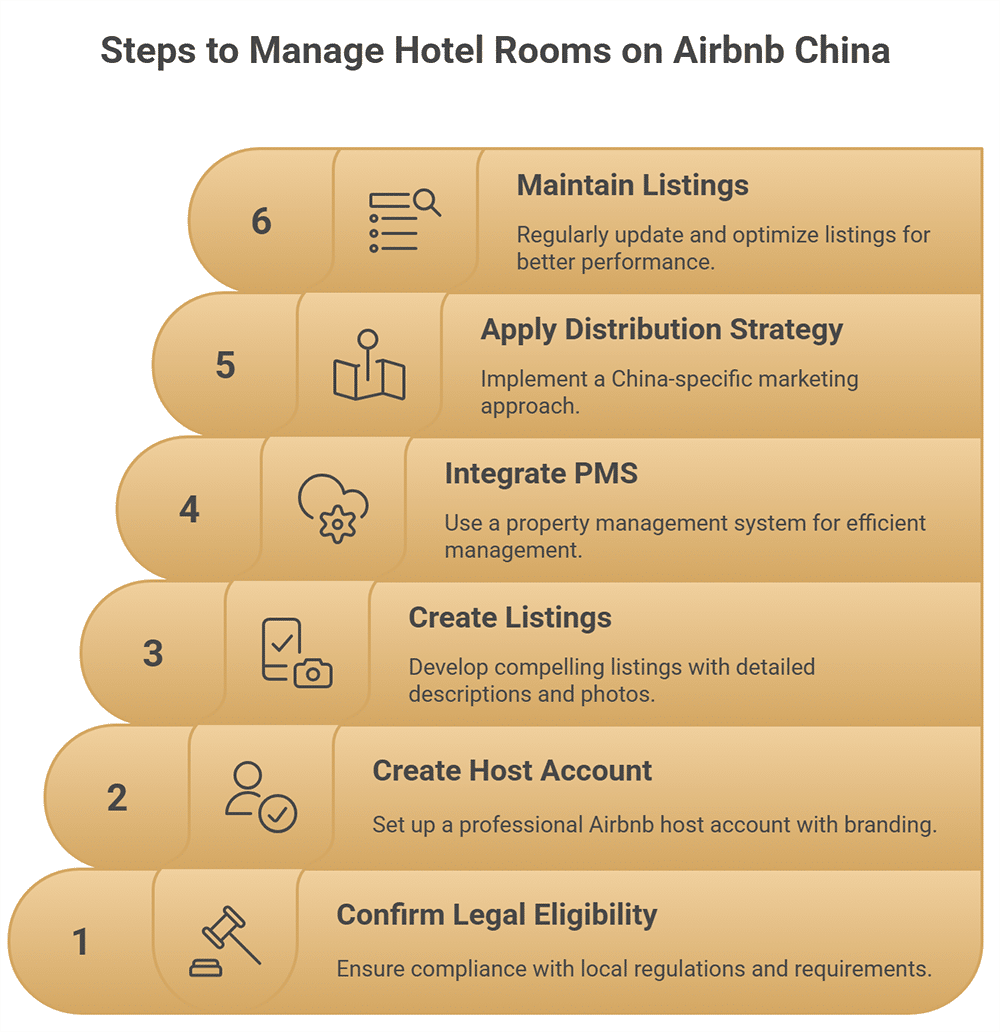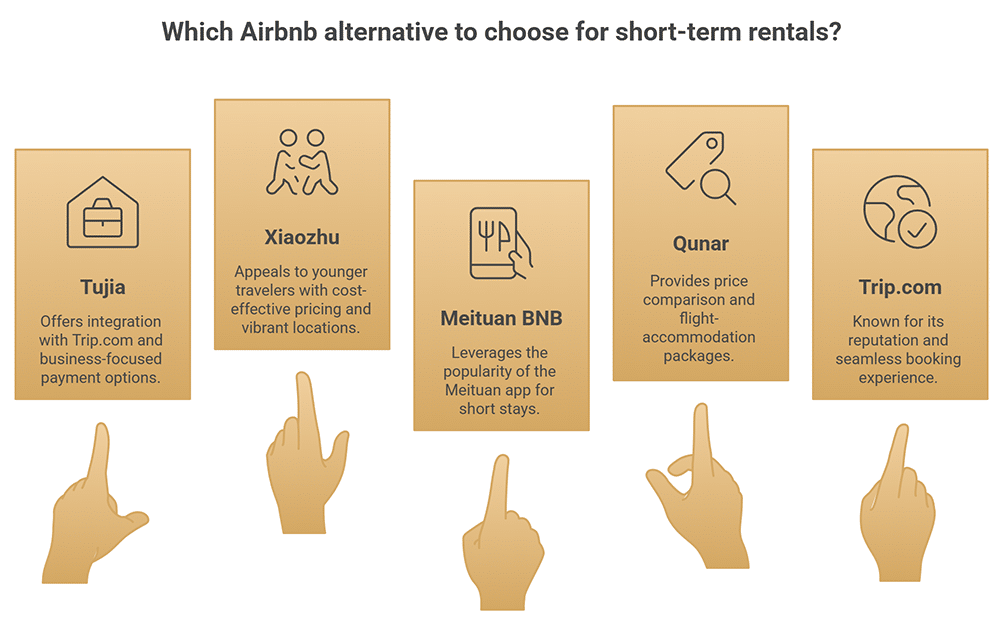Airbnb China was a pioneering attempt to bring the platform and overseas guests to a new Chinese market. A number of issues, including the pandemic and operational hurdles, caused Airbnb to suspend Chinese domestic operations in July 2022. Airbnb’s disappearance left a hole in the economic landscape of the hospitality industry. Hotels suddenly found themselves with new options to recapture and expand on short-term rental options in China.
In this article, you’ll see Airbnb’s work in China from start to finish while learning how the hospitality industry can fill this new niche.
Table of Contents:
What Is Airbnb China?
The term Airbnb China describes the platform’s full venture into the Chinese market. Airbnb began its attempt to leverage the platform in China in 2016 but faced significant local challenges. For example, Tujia had over a million Chinese listings while Airbnb began with only 150,000. Airbnb hoped that name recognition and superior service would provide a competitive edge. However, China has a very different cultural and legal landscape, which wasn’t compatible with Airbnb’s expectations. This would eventually lead to Airbnb ceasing Chinese domestic operations in 2022.
However, after shutting down its domestic operations, Airbnb doubled down on outbound Chinese travel. According to Airbnb China’s Spring Outbound Travel Trend Report, searches for international stays nearly doubled year-over-year ahead of the Qingming Festival, with users exploring listings in 2,700+ cities worldwide.
Airbnb’s Exit from Mainland China: What Hoteliers Need to Know
The Airbnb China venture ended in May of 2022 when the platform announced it would remove local listings in China and Chinese Airbnb Experiences. This closure of Airbnb’s domestic operations in the Chinese mainland also included properties rented to residents of China. While the end of Airbnb in China was part of a complex intersection of issues, it’s largely due to these three elements:
- Regulatory Pressure: China’s data privacy, real-name registration, and content control laws made it difficult for Airbnb to provide the same service in China that it did elsewhere.
- Local Competition: The Chinese market is strongly integrated with native mobile platforms, which ensures local operations like Tujia, Xiaozhu, and Meituan BNB had a significant advantage and could leverage understanding of consumer preferences and payment options.
- Guest Behavior and Expectations: Reliability, speed, and price are important to the average Chinese traveler, and what local apps can provide, along with strong financial incentives with travel packages and other deals.
As Tao Peng, the former president of Airbnb China, said in an interview:
“Doing business in China isn’t easy, and if you don’t deeply believe in your mission and your work, you won’t succeed.”
Video: Tech Please: Why Did Airbnb Fail in China?
Can Hotels Still Use or List on Airbnb within China?
While Airbnb China suspended domestic Chinese operations in 2022, hotels are still able to list on Airbnb. Airbnb supports stays in Beijing, Shanghai, Guangzhou, Hong Kong, Taiwan, Macau, along the East China Sea, and more. This also includes cross-border bookings into mainland China. Airbnb’s operations in China have shifted to a global rather than local distribution channel. Many hotels are eligible to list with Airbnb within China. These eligible properties include aparthotels, boutique hotels, and serviced apartments. Hosts will need to pay careful attention to Chinese laws regarding identity verification, short-term rentals, and licensing. This creates an appealing experience for inbound travelers who want to stay with a professionally maintained property.
How to List and Manage Hotel Rooms on Airbnb China
Prospective Airbnb hosts in China need to consider technological preferences, legal compliance, and methods used to appeal to potential guests. You can accomplish this through the following steps.
Step 1: Confirm Legal Eligibility and Local Compliance
Legal eligibility is one of the more difficult aspects of the Airbnb accommodation experience. You’ll need to meet the legal requirements for a short-term rental. However, these requirements vary on a region-by-region basis. The legal challenges are most significant within large cities. So if you’re considering Beijing, Shanghai, or Guangzhou, then you’ll need to look into business license requirements for hotels, tax registration numbers, and documentation for fire safety compliance.
Video: China Short-Term Rental Laws: Host’s Essential Guide
Step 2: Create a Verified Airbnb Host Account
The Airbnb China host account is similar to the standard model. However, you should create a branded account rather than a personal profile. Leverage your professionalism with logos, property photos, and to-the-point descriptions of your brand’s values and philosophy. These factors help build a bridge of trust with potential guests. However, you might need to supply Airbnb with additional documentation such as a passport, business licence, or ID. This is largely dependent on the legal standing of your hotel. If you want to find more information about a listing on an Airbnb host account, read “Airbnb Login: Tips For Airbnb Hosts To Optimize Your Listing.”
Step 3: Create Individual or Multi-Room Listings
The two options involve using Airbnb’s multi-unit listings or creating new listings for every room type. Both benefit from extra care in your descriptions and titles. The title should be compelling. The description should be an inviting and honest list of features and amenities. Images of the room, including the bathroom, and additional elements like lounges or breakfast areas help to build interest. Choose the option that best suits your property. For example, if you have multiple rooms with the same layout, then you can consolidate your efforts.
Step 4: Integrate with a Channel Manager or PMS
A Property Management System (PMS) can simplify and streamline your business. In particular, it will help you avoid double bookings and manual updates. A PMS or channel manager with support for Airbnb China provides centralized control over multiple listings. For example, you might have listings on diverse sites like Tujia, Booking.com, or others. Channel managers and PMS give you simultaneous control over all of them. SiteMinder, Rentals United, STAAH, Cloudbeds, and other options integrate with your infrastructure to concurrently push pricing changes, availability, or new restrictions onto your channels. They also provide analytics and communications features to inform and enhance guest experiences.
Step 5: Apply a China-Specific Distribution Strategy
Airbnb China has changed since 2022. But while Airbnb has withdrawn domestic support, it’s still a very real presence in China. Some of the best Airbnb cities in China are likewise unchanged, as Chengdu, Shanghai, and Guangzhou are still popular destinations for international travelers. Airbnb is still a powerful brand for travelers in China. However, you’ll need to focus on Chinese culture and values. Locals will typically stick with local Airbnb competitors in China, like Meituan or Tujia. However, you can grow your market with listings in both English and Chinese and elements that have special appeal to the market, like contactless check-in, airport transfers, 24/7 support at the front desk, and high-speed Internet. And never forget the personal touch brought by authenticity in your listings.
Step 6: Maintain and Optimize Listings Regularly
An efficient way to optimize your listings with Airbnb is to maintain active listings that retain higher ratings. The better you do, the higher Airbnb’s search algorithm will favor you. You can often accomplish this with outstanding guest services. When a guest messages, they deserve quick and informative replies. You should make sure that when people check availability, it’s up to date and has accurate pricing and photographs. Even tweaking titles in your listings and observing the results can improve your Airbnb ranking. Third-party analytic tools like Rankbreeze or Airbnb’s own dashboard system can monitor and optimize all these factors while leveraging important metrics like overall revenue, conversion rates, and views.

Best Airbnb Cities in China for Hotels
It is important to note both the most profitable Chinese cities and to focus on what makes the traveler demographics unique for each of the most important Airbnb China destinations.
- Shanghai: The strong tech sectors around Jing’an, the Former French Concession, and Xuhui have made them a destination for business travelers with a focus on technology.
- Beijing: Bilingual options and cultural landmarks such as the Forbidden City provide special appeal for tourists who want true cultural immersion.
- Guangzhou: Trade fairs make this a common destination for the business sector thanks to options near the Pazhou Exhibition Center that have appealing options for late check-in, strong Wi-Fi, and more.
- Shenzhen: This tech-heavy location is a destination for both visitors to Hong Kong and entrepreneurs looking to enjoy business-ready services for border crossing.
- Chengdu: The pandas, rich food culture, significant locations like Kuanzhai Alley, and fascinating but relaxing ambiance make it a favored destination for tourists.
- Hangzhou: Both tech campuses and West Lake properties hold appeal for business travelers and tourists who want to soak in the region’s natural beauty.
Airbnb vs. Local Competitors in China
Airbnb’s brand recognition holds strong appeal for international travelers. However, locals tend to gravitate to homegrown services for short-term rentals. According to Grand View Research, the vacation rental market in China is forecasted to reach $16.897.3 million USD by 2030, at a compound annual growth rate (CAGR) of 5.8%. The following are the best sites like Airbnb operating in China that you should be aware of.
1. Tujia (途家)
Tujia is often called the “Airbnb of China,” and as you might expect, it’s one of the platform’s most significant competitors. The service is well integrated into Trip.com, and this simplifies the process of linking trips with accommodations. This business-focused approach is furthered by payment options through WeChat Pay and Alipay while also providing specialized enterprise-level tools. On the domestic side, Tujia offers options that range from apartments in major metropolitan areas to rural homestays.
Video: How Tujia is Beating Airbnb in China
2. Xiaozhu (小猪短租)
Younger people looking for a local take on Airbnb China will often go with Xiaozhu. The platform works to leverage cost-effective pricing with the dynamic aesthetics and social atmosphere that younger travelers flock to. This philosophy can be seen in Xiaozhu’s locations, which are typically near rich nightlife, universities, or tech parks.
3. Meituan BNB (美团民宿)
The Meituan app has tremendous popularity in China, so it’s little wonder that this dedicated element is used by millions. People are already used to utilizing the app to buy everything from movie tickets to hotel reservations and all of the food options that might go with them. Meituan BNB is tremendously popular for short-stay visits and within secondary cities. If you have economy-class rooms, then you can easily leverage this volume-driven demographic.
4. Qunar (去哪儿)
Travelers are concerned with prices will typically do a lot of comparison browsing on search engines. Qunar is a meta-search engine that taps into this demographic by letting travelers discover and compare booking options that come with flight-accommodation packages. These deals are a major draw for travelers who put a priority on prices. And on the flip side, hotels benefit from the tight integration with the major payment platforms in China and their large number of users.
5. Trip.com (携程)
Trip.com easily earns a place among the best Airbnb alternatives in China due to the platform’s popularity. According to Fastdata’s China Outbound Tourism Industry Development Trend Report, Trip.com dominates the outbound travel market, holding 48.3% of the OTA market share and a greater share of 62.9% for outbound group travel. Hotels can benefit from this by leveraging Trip.com’s solid reputation. The platform is well-known to the general public and provides a number of powerful tools and support options to make travel and booking seamless. This includes around-the-clock customer support in a variety of languages, tools for corporate booking, and tight integrations with flight booking.

Practical Strategies to Attract Airbnb China Guests
The following options will help you tap into the customer base that had previously relied on Airbnb China.
- Home-Like Environments: Make some rooms cozier with decorations, kitchenettes, and homey living spaces.
- Local Authenticity: Locally sourced elements like art and decorations will attract Airbnb China guests who want to experience their destination’s culture.
- Flexible Staying Options: Create tiered plans with discounts for longer stays to attract Airbnb China guests who use the service for savings.
- Host-Inspired Services: Airbnb China benefited from local expertise, so train your own staff to offer informed opinions or create dedicated local experience roles.
- WeChat Mini-Programs: Create mini-programs inspired by Airbnb’s digital experience that can improve booking or communication, highlight enticing elements of the neighborhood, and showcase what makes your property special.
- Safety and Legal Compliance: Put guests at ease by making it clear that you’re fully compliant with regulations necessary for foreign guests.
Future Trends in China’s Accommodation Market
The Airbnb China situation has drastically changed the hospitality industry, and the future is bright for companies working with these trends.
- Hybrid Service Models: International and domestic travelers alike appreciate options that combine the coziness of a home with hotel-level amenities.
- Rural Destination Growth: People living in urban China are often especially eager to enjoy the rustic charm of countryside locations.
- Advanced Tech Integration: High-tech options, such as contactless service, personalized options powered by AI, and smart room options, are becoming the norm rather than a premium in the Chinese market.
- Regulatory Harmonization: The current legal landscape for short-term rentals can be confusing due to local variation, but the government is standardizing regulations across multiple cities.
- Super-App Ecosystems: The full hospitality industry landscape is converging within singular app ecosystems that can provide travel options, activities, meals, and even loyalty programs.
Airbnb Host Login: How to Get More Bookings on Airbnb
Asking what happened to Airbnb within China offers reminders of just how important the brand is. Likewise, the global market still exists for Chinese properties interested in international travelers. You can find out how to tap into Airbnb’s impressive ecosystem, work with their native tools, and optimize your work with them through analytics in the article “Airbnb Host Login: How to Get More Bookings on Airbnb.”
Airbnb Pricing Strategies: Ultimate Guide for Revenue Management
One of the most important lessons to learn from Airbnb China is how difficult it can be to compete with established brands and platforms. While Airbnb might have withdrawn from the domestic landscape of China, the competition is still fierce, and so is the importance of proper pricing strategies. You’ll learn how to create powerful strategies using pricing honed on your own data, increase your brand’s visibility in the rankings, and the most efficient ways to use Airbnb’s own analytic tools in the article “Airbnb Pricing Strategies: Ultimate Guide for Revenue Management.”
FAQ Section: Airbnb China
Airbnb China opens up the path to some exciting and rewarding possibilities for hoteliers. If you balance what makes your hotel special with the best traits of Airbnb, then you can grow within these newly opened spaces and cultivate their opportunities.
Did You Like This Article about Airbnb China?
You might also be interested in the following articles:
More Tips to Grow Your Business
Revfine.com is the leading knowledge platform for the hospitality and travel industry. Professionals use our insights, strategies, and actionable tips to get inspired, optimize revenue, innovate processes, and improve customer experience.
Explore expert advice on management, marketing, revenue management, operations, software, and technology in our dedicated Hotel, Hospitality, and Travel & Tourism categories.
This article is written by:
Hi, I am Martijn Barten, founder of Revfine.com. With 20 years of experience in the hospitality industry, I specialize in optimizing revenue by combining revenue management with marketing strategies. I have successfully developed, implemented, and managed revenue management and marketing strategies for individual properties and multi-property portfolios.










